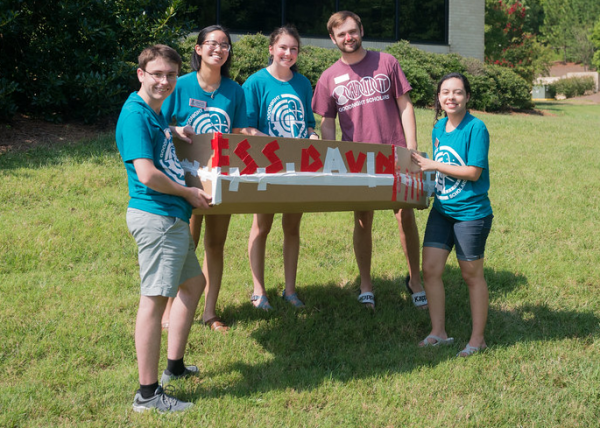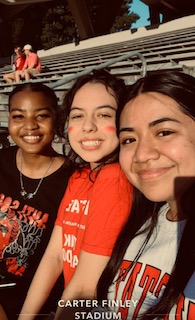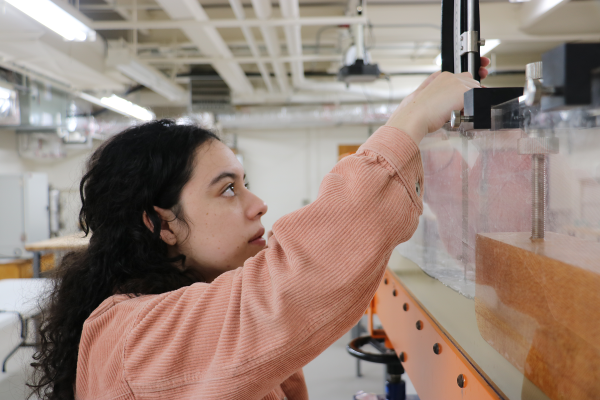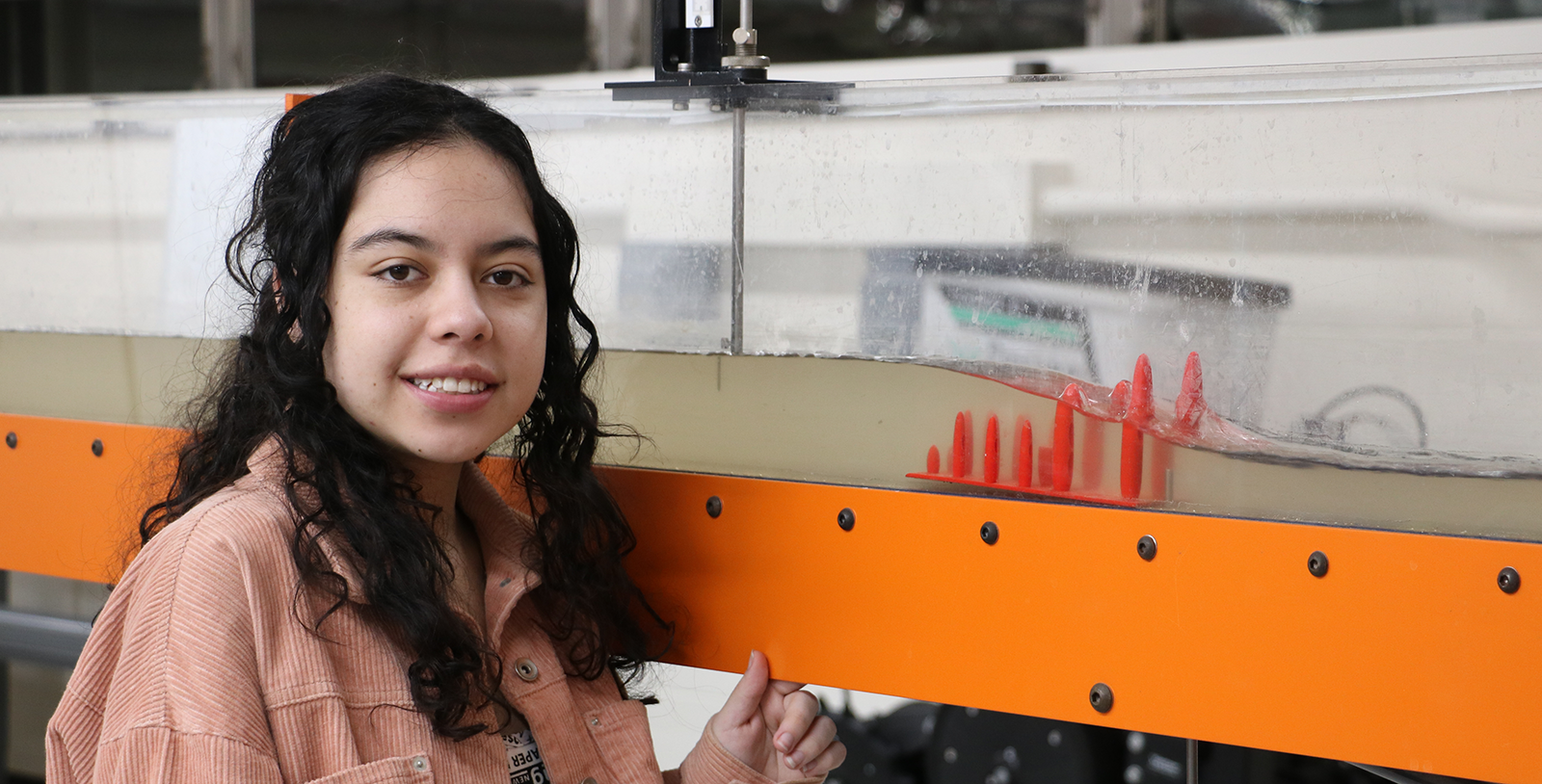Laura Riddle
The daughter of a math teacher and an English language teacher, education has been a driving force throughout Laura Gomez Rodriguez’s life.

Born in Bogota, Colombia, she moved to the United States with her parents, Claudia Rodriguez and Carlos Gomez, when she was seven years old. Their journey was facilitated through a three-year Colombian collegiate exchange program her father entered to pursue a master’s degree in the U.S.
After five years, including a two-year extension, her parents decided to remain in the U.S. so Laura would have access to educational opportunities that weren’t available in Colombia. They both found teaching positions with Asheboro City Schools, and Laura was able to attend middle and high school in North Carolina. By her senior year, Laura had enrolled in the North Carolina School of Science and Mathematics online program, which exposed her to a wide range of topics that enabled her to navigate future decisions based on her academic interests.
“I’ve always been interested in the environment, dealing with animals or plants and being outside,” she explains. “I’ve also really liked math and science and just overall STEM-related fields.” She focused her collegiate search to those with environmental engineering programs and chose to attend NC State in fall 2019.
As an incoming first-year student, Laura was recognized as both a University Scholar and a Goodnight Scholar.
The University Scholars Program was developed to provide an enriched academic experience for a select group of students by introducing them to the visual and performing arts, encouraging them to consider issues drawn from the sciences and politics, challenging them academically and inspiring them to explore and engage through international and outdoor education programs. Only 500 high-achieving and academically-motivativated incoming freshman are welcomed into the program in the fall semester each year.

The Goodnight Scholars Program is a comprehensive student development program designed to develop scholars into leaders within the STEM and STEM education fields. The program offers 50 first-year students studying in these disciplines a renewable four-year scholarship and access to a variety of enrichment, professional development, mentorship and networking opportunities throughout their undergraduate studies.
Like all first-year engineering students, Laura was enrolled in Engineering 101: Introduction to Engineering and Problem-Solving. During the course, students are given opportunities to explore and learn about all the engineering concentrations within the university system. Laura chose to attend a Biological and Agricultural Engineering (BAE) info session because of its similarities to environmental engineering.
BAE info sessions include research demonstrations from faculty and students, networking with student club representatives and hands-on interaction with some of the department’s engineering equipment. An interdisciplinary department between the College of Agricultural and Life Sciences and College of Engineering, BAE majors combine engineering principles and the fundamental concepts of biology to agricultural and biological systems and tools to address grand challenges in the production, processing, and management of agricultural, biological, food and natural resources systems.
At the time, Laura wasn’t expecting to change her major, until she met BAE Assistant Professor Natalie Nelson. “I had another class assignment that I had to interview someone in my interested field, so I asked [Nelson] if I could interview her,” she explains. ”From that, just hearing her talk about her experiences, her research in the department, the major itself and overall just seeing, like the slogan [BAE students, faculty and staff] have, which is ‘big school resources with a small family community’, made me realize that this is definitely the area I wanted to study.”
Finding a Place in the NC State Community
Another of Laura’s first-year experiences came during Summer Start where she was introduced to the Women and Minority in Engineering Programs (WMEP). The program, sponsored by the College of Engineering Office of Academic Affairs, is focused on informing and recruiting women and minority populations about the engineering profession and the university’s engineering programs. The objective is to create a learning environment conducive to addressing challenges frequently experienced by underrepresented populations with the intent of graduating students into computer science and engineering fields.

Underrepresented minority students and women are welcomed into the NC State community by way of WMEP prior to their first semester via summer bridge experiences that help them get acclimated to campus. WMEP has a student resource room where students can gather while learning about other resources and services that are available to them.
“[WMEP] helped us through getting acclimated in a [predominantly white institution], and navigating challenges we could face and creating a support system,” Laura explains. “We were able to meet our peers, so that we would know other people in our class and other people of color, and other women in the department before the full school year started.”
Like Laura, creating a support system for students by establishing relationships with their peers and WMEP faculty and staff early in their college experience helps them through graduation and into the workforce.
The incoming First-Year engineering class is 33% female and 15.4% minority.
“These are wonderful percentages, and we’re working hard to increase them,” explains the Minority Engineering Programs Director Angelitha Daniel. “The work that we have to do is create an environment where these students feel like they belong, ensuring that the culture across the college is conducive for learning and professional development. If you don’t have a program like WMEP to recruit students with diverse backgrounds and build a community of support, you’re never going to come up with an engineering solution that works for everyone because the best solutions came from different perspectives.”
When the program asked for volunteers to mentor incoming students, Laura signed up. She credits WMEP for making her feel welcomed and comfortable during her first year at NC State and wanted others to benefit from having a similar experience.
“Our Dean calls it existence proof. It’s critical for students to see in their mentors, someone who was able to balance academics and activities outside of the classroom, and do it well,” explains Daniel. “Laura brings that to her mentee group. They’re able to access her and ask any questions. Because she is connected, she’s able to engage them in ways that students who may not be as connected can. Her presence is very important in terms of letting students know they can do it, and they can do it well.”

Inspiring Change through Research and Action
By the end of her first year, Laura was a University Scholar as well as a Goodnight Scholar, and her list of campus activities included Engineers Without Borders, Goodnight Ambassador and mentoring through Women in Science and Engineering (WISE) and WMEP. Since then, she has also been appointed a National Academy of Engineering (NAE) Grand Challenge Scholar and a BAE Ambassador.
From the moment she stepped onto campus, Laura was intent on acquiring research experience. To date, her positions include assisting Nelson with the development of a forecasting application for shellfish farmers called ShellCast, and work on another study monitoring SARS-CoV-2 transmission through wastewater systems. She is currently preparing for research on a phosphorus pollution study with Civil, Construction and Environmental Engineering Associate Professor Daniel Obenour that will begin this spring.
“Since her first semester at NC State, she’s been exploring ways of expanding her education and extracurriculars to position herself to be an agent of positive change,” explains Nelson, who is also Laura’s career advisor and NAE Grand Challenge Scholar mentor. “I’ve been struck by Laura’s commitment to service-oriented positions, and her interests in the intersection of engineering and policy.”
Laura will also be participating in the Kenan Institute for Engineering, Technology and Science (KIETS) Climate Leaders Program with Nelson as her mentor this spring. The program is focused on building partnerships between students, faculty mentors and internships hosts who work together on developing solutions that address problems created by climate change. Nelson explains the KIETS program will provide Laura with the leadership training and network to participate in an experience that would allow her to apply her engineering education towards policy.
“As engineers, we can build the best invention or find the best solution, but without being able to talk to the public and convince the public that these are important measures, then nothing is going to change,” Laura says.
When asked what keeps her motivated, Laura says her parents, and being passionate about her goals.
“I have two main motivators in my life; my parents who have sacrificed so much for me to have the opportunities I can take advantage of today. And myself, I am ultimately the only one responsible for my success and the life I want in the future.”

